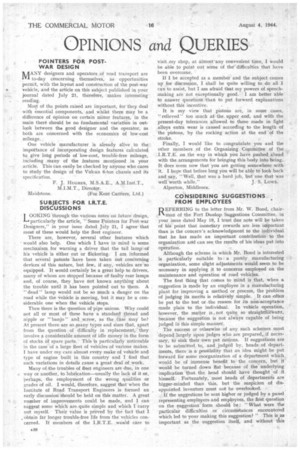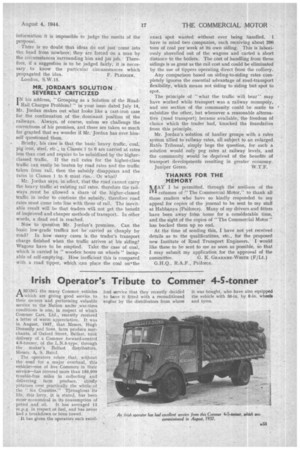OPINIONS and
Page 32

Page 35

If you've noticed an error in this article please click here to report it so we can fix it.
UERIES
POINTERS FOR POST WAR DESIGN
wilANY designers and operators of road transport are AVI, to-day concerning themselves, as opportunities permit, with the layout and construction of the post-war vehicle, and the article on this subject published in your journal dated July 21, therefore, makes interesting reading.
Most of the points raised are important, for they deal with essential components, and whilst there may be a difference of opinion on certain minor features, in the main there should be no fundamental variation in outlook between the good designer and the operator, as both are concerned with the economics of low-cost mileage. One vehicle manufacturer is already alive to the importance of incorporating design features calculated to give long periods of low-cost, trouble-free mileage, including many of the features mentioned in your article. This can easily be checked by anyone who cares to study the design of the Vulcan 6-ton chassis and its specification.
F. J. HUGHES, M.S.A.E., A.M.Inst.T., M.I.141.T., Director.
Maidstone. (For Rent Carriers, Ltd.) SUBJECTS FOR I.R.T.E. DISCUSSIONS
LOOKING through the various notes on future design,L-oparticularly the article, "Some Pointers for Post-war
Designers," in your issue dated July 21, I agree that most of these would help the fleet engineer.
There are, however, several other features which would also help. One which I have in mind is some mechanism for warning a driver that the tail lamp of his vehicle is either out or flickering. I am informed that several patents have been taken out concerning devices of this nature, but few, if any, vehicles are so equipped. It would certainly be a great help to drivers, many of whom are stopped because of faulty rear lamps and, of course, they have not known anything about the trouble until it has been pointed out to them. A " dead " lamp would not be so much a danger on the road while the vehicle is moving, but it may be a considerable one when the vehicle stops.
Then there is the question of pipe unions. Why could not all or most of these have a standard thread and nipple or " banjo " and screw, as the case may be? At present there are so many types and sizes that, apart from the question of difficulty in replacement, they involve a considerable amount of idle money in the form of stocks of spare parts.' This is particularly noticeable in the case of a large fleet of vehicles of various makes. I have under my care almost every make of vehicle and type of engine built in this country and I find that such variations in details cause a great deal of work.
Many of the troubles of fleet engineers are due, in one way or another, to lubrication—usually the lack of it or, perhaps, the employment of the wrong qualities or grades of oil. I would, therefore, suggest that when the institute of Road Transport Engineers is formed an early discussion should be held on this matter. A great number of improvements could be made, and I can suggest some which are quite simple and which I carry out myself. Their value is proved by the fact that I , obtain far longer trouble-free life from the vehicles concerned. If members of the I.R.T.E. would care to
visit my shop, at almost-any convenient time, I would be able to point out some of the difficulties that have been overcome.
If I be accepted as a member and the subject comes up for discussion, I shall be quite willing to do all I can to assist, but I am afraid that my powers of speechmaking are not exceptionally good. I am better able to answer questions than to put forward explanations without this incentive. .
It is my view that pistons are, in some cases, "relieved '• too much at the, upper end, and with the present-day tolerances allowed to those made in light alloys extra wear is caused according to the length of the pistons, by the rocking action at the end 'of the stroke.
Finally, I would like to congratulate you and the other members of the Organizing Committee of the I.R.T.E. on the way in which you have pushed ahead with the. arrangements for bringing this body into being. It does seem now that you are getting somewhere with it. I hope that before long you will be able to look back and say, "Well, that was a hard job, but one that was
well worth while." J. S. LOWE. Alperton, Middlesex.
CONSIDERING SUGGESTIONS FROM EMPLOYEES
RDEFERRING to the letter from Mr. W. Bond, chairs-A-man of the Fort Dunlop Suggestions Committee, in your issue dated May 19, I trust due note will be taken of his point that Monetary rewards are less important than is the concern's acknowledgment to the individual that he has made an important contribution to the organization add can see the results of his ideas put into operation.
Although the scheme in which Mr. Bond is interested is particularly suitable to a purely manufacturing organization, some slight adjustMents would seem to be necessary in applying it to concerns employed on the maintenance and operation of road vehicles.
The first thing that comes to mind is that, when a suggestion is made by an employee in a manufacturing plant for improving a method or process, the -problem of judging its merits is relatively simple. It can often be put to the test or-the reason for its non-acceptance made plain to the individual. In vehicle operation, however, the matter is • not quite so straightforiVara, because the suggestion is not always capable of being judged in this simple manner.
The success or otherwise of any such schemes must depend largely upon judges who are prepared, if necessary, to sink their own pet notions. If suggestions are to be submitted to, and .judged by, heads of departments, there is S, possibility that an idea might be put forward for some reorganization of a department which would be of immense benefit to the concern, but it would be turned down 'fiat because of the underlying implication that the head should have thought of it himself. Fortunately, most heads of departments are bigger-minded than this, but the suspicion of disappointed inventors must not be overlooked. If the suggestions be sent higher or judged by a panel representing employers and employees, the first question on the suggestion form should be: "What were the particular difficulties or circumstances encountered which led to your making this suggestion? " This is as important as the suggestion itself, and without this information it is impossible to judge the merits of the proposal.
There is no doubt that ideas do not just come into the head from nowhere; they are forced on a man by the circumstances surrounding him and is job. Therefore, if a suggestion is to be judged fairly, it is necessary to know the particular circumstances which propagated the idea. F. PLEDGER. London, S.W.15.
MR. JORDAN'S SOLUTION SEVERELY CRITICIZED
IN his address, " Grouping as a Solution of the Road' Rail Charges Problem? " in your issue dated July 14, Mr. Jordan makes out what looks like a cast-iron case for the continuation of the dominant position of the railways. Always, of course, unless we challenge the correctness of his premises, and these are taken so much for granted that we wonder if Mr. Jordan has ever himself questioned them.
Briefly, his case is that the basic heavy traffic, coal, pig iron, steel, etc., in Classes 1 to 6 are carried at rates less than cost and require to be subsidized by the higherclassed traffic. If the rail rates for the higher-class traffic can easily be beaten by road rates and the traffic taken from rail, then the subsidy disappears and the rates in Classes 1 to 6 must rise. Or what?
Mr. Jordan says, in effect, that the road cannot carry the heavy traffic at existing rail rates, therefore the railways must be allowed a share of the higher-classed traffic in order to continue the subsidy. therefore road rates must come into line with those of rail. The inevitable result will be that traders will not get the benefit of improved and cheaper methods of transport.. In other words, a dead end is reached.
Now to question Mr. Jordan's premises. Can the basic low-grade traffics not be carried as cheaply by road? In how many cases is the trader's transport charge finished when the traffic arrives at his siding? Wagons have to be emptied. Take the case of coal, which is carried in " wooden boxes on wheels " incapable of self-emptying. How inefficient this is compared with a road tipper, which can place the coal on'the exact spot wanted without ever being handled. I have in mind two companies, each receiving about 200 tons of coal per week at its own siding. This is laboriously shovelled out of the wagons and carted a short distance to the boilers. The cost of handling from these sidings is as great as the rail cost and could be eliminated by the use of tippers operating direct from the colliery.
Any comparison based on siding-to-siding rates completely ignores the essential advantage of road-transport flexibility, which means not siding to siding but spot to spot.
The principle of "what the traffic will bear" may have worked while transport was a railway monopoly, and one section of the community could be made to subsidize the other, but whenever a reasonable alternative (road transport) became available, the freedom of choice which the trader had, knocked the foundation from this principle.
Mr. Jordan's solution of haulier groups with a rates system allied to railway rates, all subject to an enlarged Rat(ls Tribunal, simply begs the question, for such a solution would only peg rates at railway levels, and the community would be deprived of the benefits of transport developments resulting in greater economy.
Juniper Green. W.T.F.
THANKS FOR THE MEMORY
JAY I be permitted, through the medium of the IVI columns of "The Commercial Motor," to thank all those readers who have so kindly responded to my appeal for copies of the journal to be sent to my staff at Habbanya (Paiforce). Many of my drivers and fitters have been away from home for a considerable time, and the sight of the copies of "The Commercial Motor" has bucked them up no end.
At the time of sending this, I have not yet received details as to the qualifications, etc., for the proposed new Institute of Road Transport Engineers. I would like these to be sent to me as soon as possible. so that
may submit my application for the approval of the
committee. G. K. GRAIIAME-WHITE (F/Lt.) G.H.Q., R.A.F., Paiforce.




















































